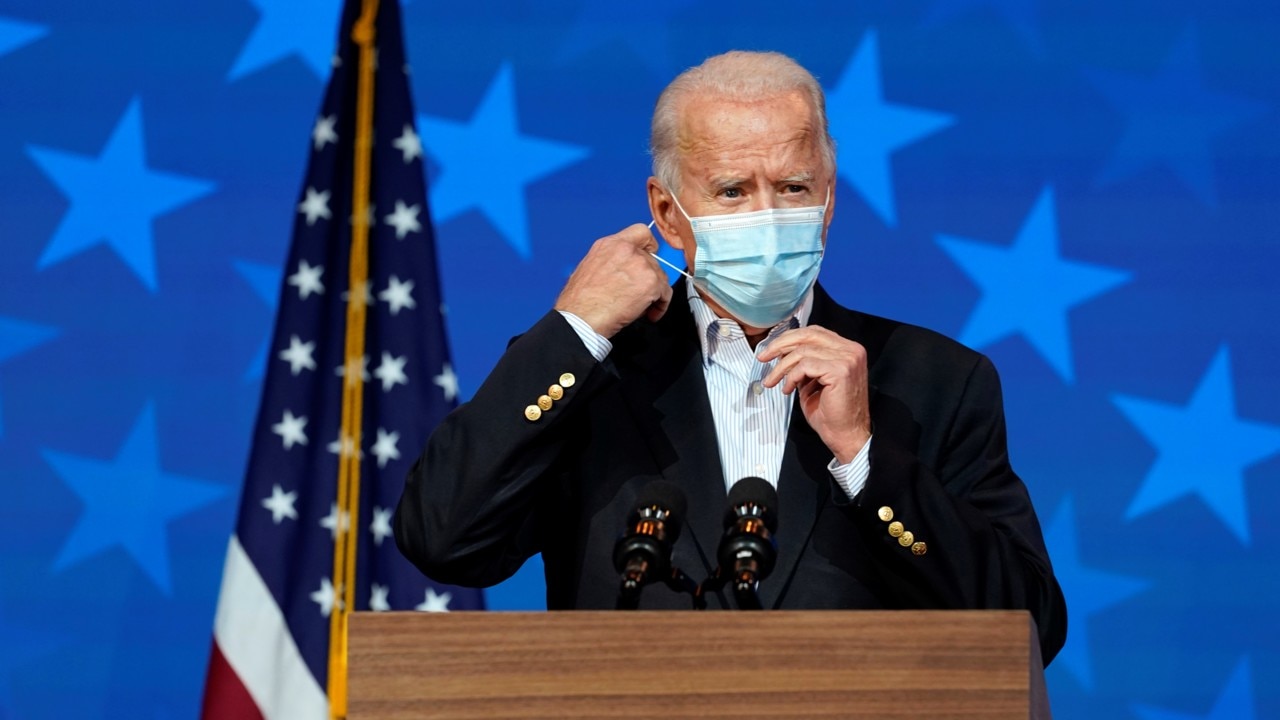US election 2020: The current state of play
If you’re just waking up and wondering what the hell is going on with the election, you’re not alone. Here’s what you need to know.

Good morning – Friday morning.
If you’re just waking up and wondering what the hell is going on with the election, you’re not alone.
Here’s a quick rundown of the state of play as Thursday afternoon rolls into Thursday evening in the United States.
WHO IS WINNING?
Nothing much has changed since you went to bed last night.
Joe Biden is still sitting on 264 electoral votes, ahead of Donald Trump who is on 214.
The Democratic nominee is just six shy of the magic number 270 needed to win.
The key states still in play are Pennsylvania (20 electoral votes), Georgia (16 electoral votes), Arizona (11 electoral votes) and Nevada (six electoral votes).
Technically North Carolina (15 electoral votes) and Alaska (three electoral votes) are still in play, but they are pretty safe bets for Mr Trump.
If Mr Trump wins those two, he would move to 232.
One key point – Mr Biden’s 264 number assumes he has won Arizona. The state has been called by Fox News and AP, but counting has not finished and there is still a chance the Republican could win there.
Mr Trump is ahead in Georgia by about 13,000 votes and Pennsylvania by less than 100,000, but trailing by 11,000 in Nevada and 68,000 in Arizona.
WHEN WILL WE KNOW?
Pennsylvania and Georgia are expected to announce results later today.
We will also get a few more numbers out of Arizona.
But we won’t get final results from Arizona until at least tomorrow, and for Nevada and North Carolina we will be waiting until next week.
The big clincher today would be Pennsylvania – if Mr Biden wins, it’s over, even without a final call on Arizona.
If he wins Georgia but not Pennsylvania, it’s more difficult. Without Arizona, that would land him on 269, meaning he would need another state.
CAN TRUMP STILL WIN?
Yes, but it’s looking less and less likely.
To hold onto the presidency, Mr Trump needs to win Pennsylvania, Georgia and North Carolina, plus either Nevada or Arizona.
If he takes those three plus Arizona but not Nevada, he reaches 276 – with Nevada, 282.
WHY IS IT TAKING SO LONG?
Each state has different issues.
In Arizona, the holdup is largely because workers have to verify signatures on ballots before they can be tabulated.
As of Thursday morning, Georgia was still trying to determine how many outstanding provisional ballots needed to be counted, and in an afternoon update officials put the number at just over 61,000.
“The issue we have in Georgia is … it’s a close vote,” said voting system implementation manager Gabriel Sterling. “There’s other states that have more votes to count than we do, but it’s a wide margin, so nobody cares.”
North Carolina is waiting until November 12 to see if 116,000 outstanding absentee ballots arrive – they can be counted if they are postmarked by November 3.
It’s the same story in Nevada, where officials will continue to count mail-in ballots received up until November 10. It’s one of a handful of states where ballots were mass mailed to all registered voters, like Big W catalogues.
Pennsylvania still has about 370,000 ballots to count, but more continue to arrive – state law allows mail-in ballots to be received and counted until Friday, even if they don’t have a postmark.
WHAT ABOUT THE LEGAL CHALLENGES?
The Trump campaign has launched a wave of legal challenges, claiming Democrats are trying to “steal” the election.
Many states quickly reported the results from in-person ballots on election night, giving Mr Trump an early lead in several battleground states.
Those leads were then offset as mail-in and early votes were added to the tallies.
“This is a major fraud on our nation,” Mr Trump said in the early hours of Wednesday. “We want the law to be used in a proper manner. So we’ll be going to the US Supreme Court. We want all voting to stop.”
Lawsuits have been launched so far in Wisconsin – where they are demanding a recount – Michigan, Georgia and Pennsylvania.
Broadly, Republicans are demanding for only votes that came in by election day or before, according to state law, to be counted.
They have also called for a halt to vote counting in some areas where they claim their observers have been blocked.




